Exodus is a non-custodial wallet that supports multiple cryptocurrencies, including Bitcoin, and it has generated a great deal of buzz since its launch in 2016.
It is a well-designed wallet that is aesthetically pleasing and packed with numerous features such as an option that allows users to stake assets directly within the wallet to earn passive income, and users can even exchange cryptocurrencies within the wallet. Exodus wallet supports thousands of assets, and their instant exchange integration feature allows users to swap over 100 supported digital currencies, meaning the coins never have to leave the safety and security of the user’s own wallet.
However, is the wallet still safe and reliable?
In this Exodus wallet review, I will give you everything that you need to know about the wallet by digging into its security, reputation, and some of the features available in the wallet. I will also give you some top tips when using Exodus and storing your crypto.
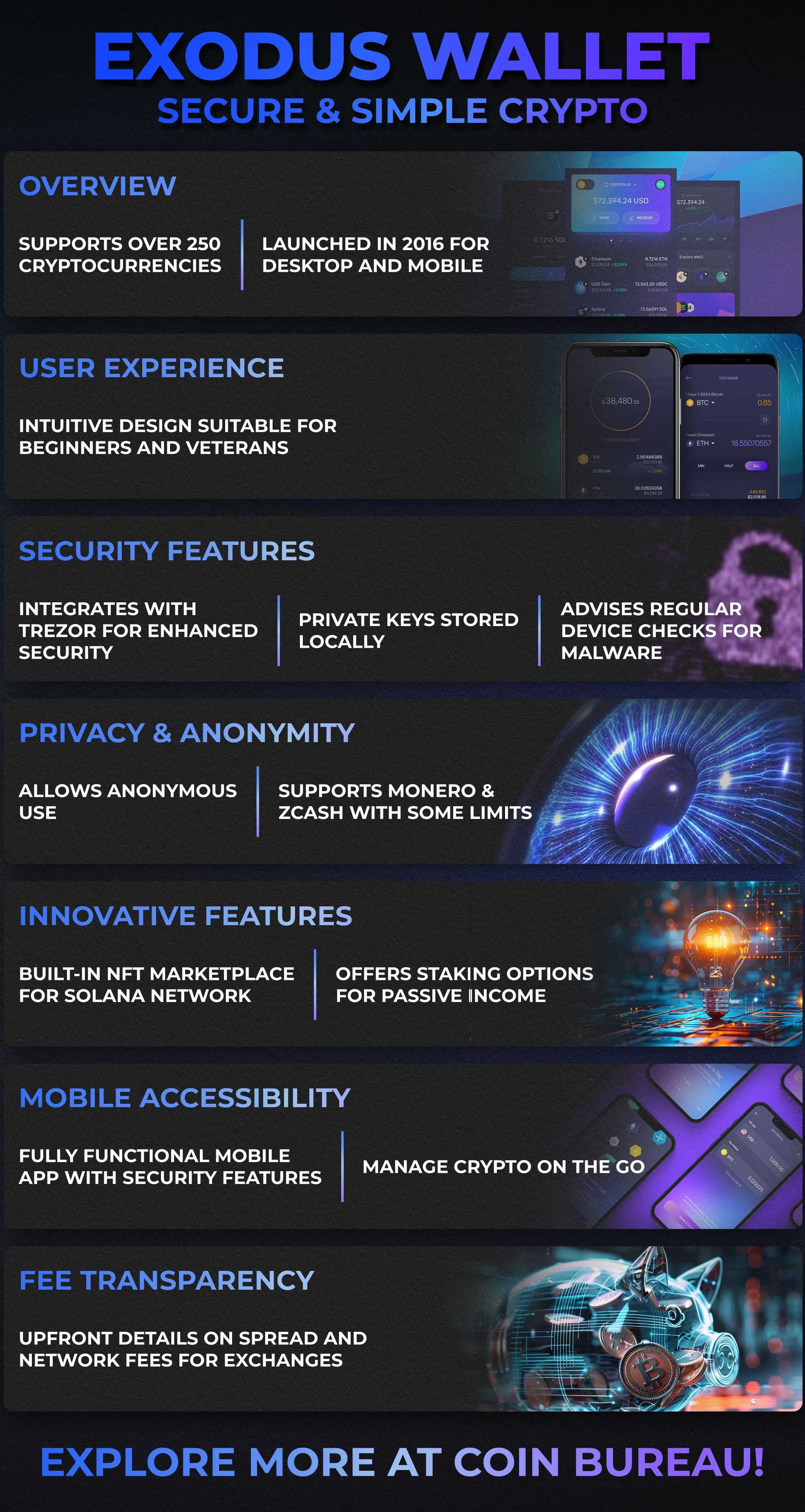
Ideal Exodus Crypto Wallet User
The Exodus crypto wallet was built with an easy-to-use interface, perfect for new users, but robust and secure enough for crypto veterans, making it ideal for most mainstream crypto enthusiasts who are looking for a secure, easy-to-use, beautiful wallet that offers a whole host of functions and features. It’s also a great choice for those who hold a variety of popular coins since it supports over 250 different cryptocurrencies, with more being added all the time.
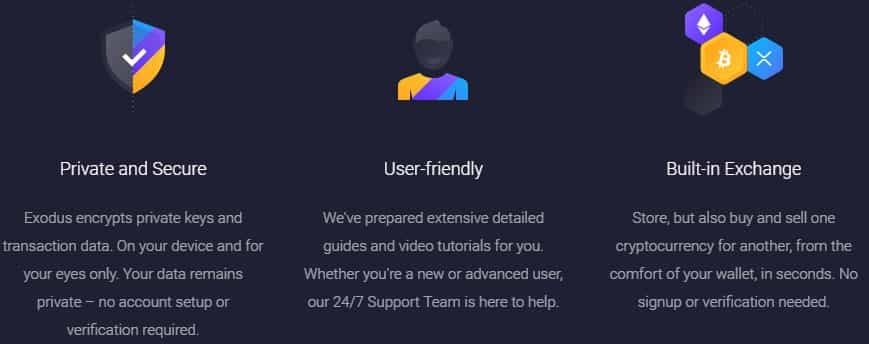
The Exodus desktop wallet is currently available for Windows, Linux and Mac OSX operating systems for desktops, and a mobile version is available for both iOS and Android. All the available versions can be downloaded from the Exodus website directly, or found in the Apple App Store and Google Play Store.
Exodus Wallet Security and Trezor Integration
Exodus wallet is as safe and secure as a software wallet can be, keeping in mind, as with any desktop or mobile cryptocurrency wallet, Exodus wallet is only as secure as the device it is installed on. If the device that holds a cryptocurrency wallet has a virus, malware, or is compromised, the security of the wallet is at risk. Exodus has written an extensive in-depth article on all the best practices to follow to keep your crypto safe which is worth reading for any crypto user.
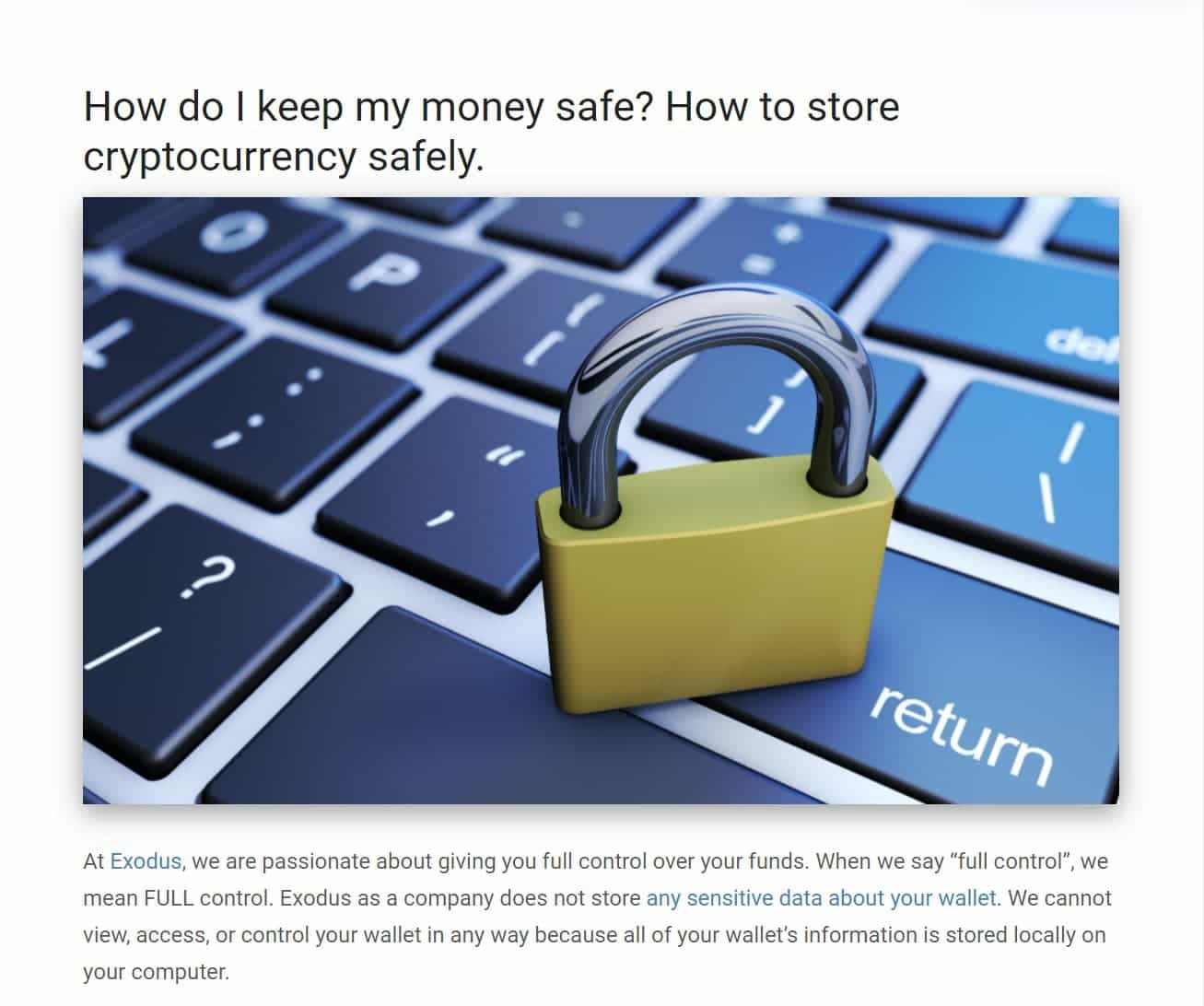
One of the largest criticisms when reading Exodus reviews from users is the lack of integration with traditional two-factor authentication methods such as Google Authenticator or Authy. There are two reasons that Exodus opts not to offer support for features such as email backups or 2-factor authentication. One of the reasons is due to potential security breaches and hacks of a user’s email, Exodus wanted to limit reliance on the security of third-party applications.
The other reason is that Exodus, above all else, believes in the privacy and non-custodial rights of their users, as they believe in their communities’ right to privacy and decentralization. Exodus does not collect any personal information on behalf of its users and, therefore, email backups are not supported, and in order for two-factor authentication to work, the company needs to store a database of user accounts on their servers.
Since the Exodus wallet creates, encrypts and stores all of the user’s information on their local device, adding the support of traditional two-factor authenticator methods was not a plausible addition to the wallet’s security. You can read more on Exodus’ official explanation of the support of 2-FA to learn more.
Pro tip: Ensure your device is free of any malware or viruses before using software wallets. Be sure to run top anti-virus programs on your devices, and remain safe when online, not clicking unknown or untrusted links or downloading untrusted files.
The Exodus wallet itself is accessed with a secure password, which should be sufficient for most users. For users who hold larger amounts of assets, or for the security-minded, Exodus has formed a partnership and integration with the Trezor hardware wallet for an additional layer of security. This was Exodus’ answer to user requests wanting two-factor authentication and increased security, and Exodus took that request to the next level. The integration of the Trezor hardware wallet with Exodus gives users the security and peace of mind of a hardware wallet while providing the convenient features, functionality, and user interface of the Exodus software wallet.
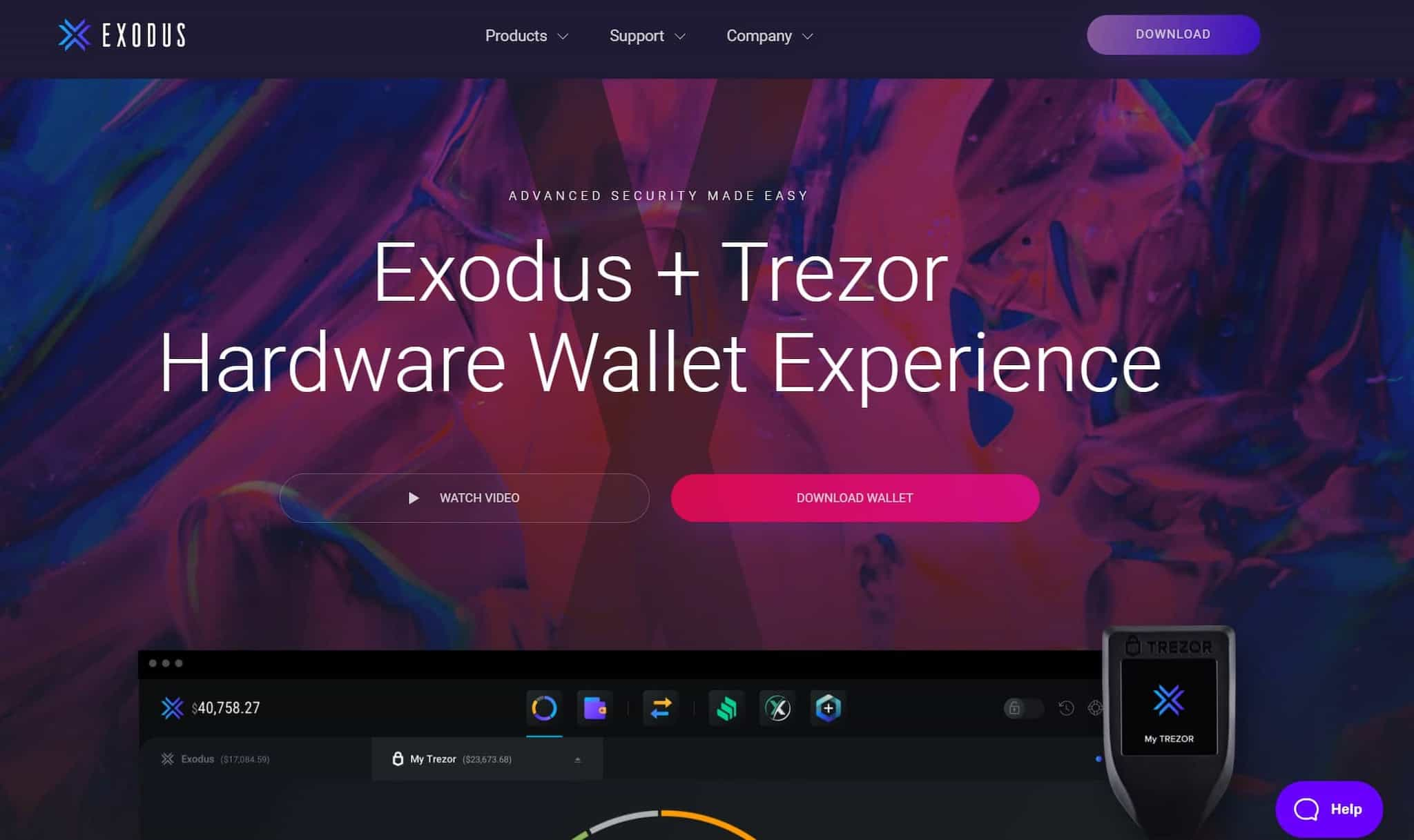
Device Support 💻: This will work with both the Trezor Model One ($69) and Trezor Model T ($219)
Of course, the main benefit of this is the fact that current Exodus users now have the option of keeping their private keys offline. With the Trezor device, all authentications and signing are done on the Trezor device and not on your computer or mobile.

Some users might be put off by the fact that the code for the Exodus wallet is not 100% open-source, but one of the founders (JP Richardson) is considered to be very trustworthy within the developer community, having contributed over 190 open-source libraries.
They have stated that keeping a few “trade secrets” has allowed them to ensure the long-term success of the company and improve the security of the wallet. Not open-sourcing these critical components makes it harder for hackers to bootleg the wallet and develop phishing versions. Moreover, many of the functional components in Exodus are open source and available on their Github. You can read Exodus’ official explanation about open source code for the Exodus wallet on their site.
Overall, the Exodus wallet meets the security requirements expected from one of the most widely used hot wallets, with the Trezor integration making it one of the most secure options out there for software wallets. It certainly beats online wallets, and many desktop wallets as well. Exodus users keep full control of their private keys, which are generated and stored locally on the user’s device.
Exodus Wallet Privacy
The Exodus wallet can be used completely anonymously as no personal information is required to download, install or use the wallet. Exodus doesn’t collect any personal information, and private keys also remain fully in the user's control. That said, Exodus isn’t focused on anonymity.
Public keys and transactions made with the wallet are fully visible on the blockchain and there are no features for hiding your transactional trail. While they do support privacy coins such as Monero (XMR) and Zcash (ZEC), they are unable to perform fully shielded transactions for Zcash. If transaction privacy is a chief concern of yours then you may want to consider using the core wallets of ZCash, or transact in privacy coins such as Monero (XMR).
Exodus Supported Coins
When first released, Exodus supported just a handful of cryptocurrency assets, but as it grows, it adds new coin support all the time, currently supporting over 260 cryptocurrencies and more are being added all the time. Multi-currency support is one of the strong features of Exodus.

In fact, you can store any ERC-20 token in Exodus, even if they aren’t listed as supported. The downside to this is you can’t see the balance of these unsupported ERC-20 coins in the Exodus wallet. Instead, you will need to view the balances using an Ethereum blockchain explorer and may need to import your private keys into a wallet that does support the asset in order to transact with it.
You can see a full list of the coins that they support on their Status Page and it is a good idea to have a look here to ensure your asset is supported before sending funds to your Exodus wallet. The status page is also a great place to check before making crypto transactions to check for any updates regarding network or asset issues.
Creating a Wallet Backup
When the wallet is first installed users are given a unique 12-word recovery seed phrase that can be used to restore the wallet if the device that the wallet is installed on is ever stolen, destroyed or lost. This means it is crucial for users to write down this seed phrase and keep it safe. If you ever need to restore a previous Exodus wallet, users can simply download Exodus to a new device and when installing it click the “Restore Wallet” option, and restore the previous wallet using the 12-word recovery phrase associated with the previous wallet.
Exodus used to provide backup support via email and this is still an option if you created your wallet prior to Exodus version 19.2.1. However, given the risks that came with having these links in emails, they have stopped supporting this. If your wallet was created in an earlier version then you can follow these steps in order to restore it.
Exchanging Assets Within Exodus Wallet
While Exodus Wallet itself isn’t an exchange, the wallet does allow you to exchange supported cryptocurrencies with each other directly in the app through the use of non-custodial, third-party API Exchange providers which allow users to swap their favourite assets without the need for KYC identification verification.
If you have coins in your wallet and would like to exchange them, then all you need to do is click on the “exchange tab." Here, you can select the coin that you would like to exchange as well as which one you would like to exchange it for.
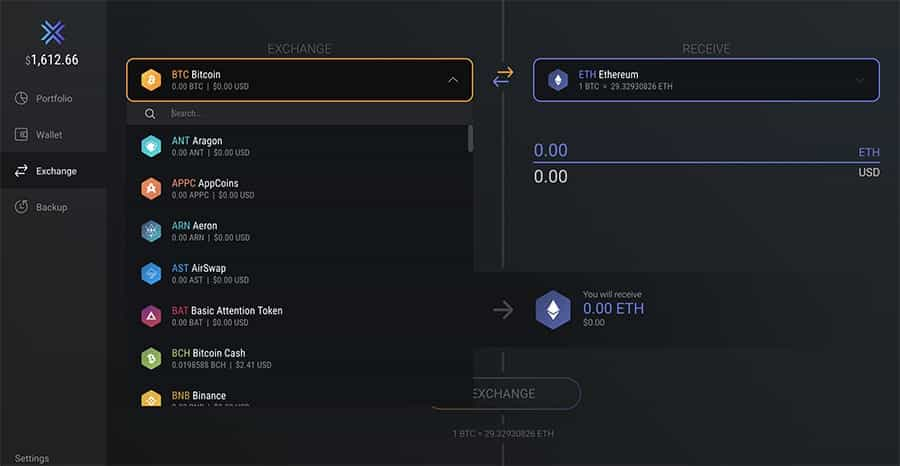
Once you have done this you will need to select the amount that you are exchanging. You could select preset values such as ALL, HALF or MIN. You can also choose a given amount of the coin or even the value in your local currency.
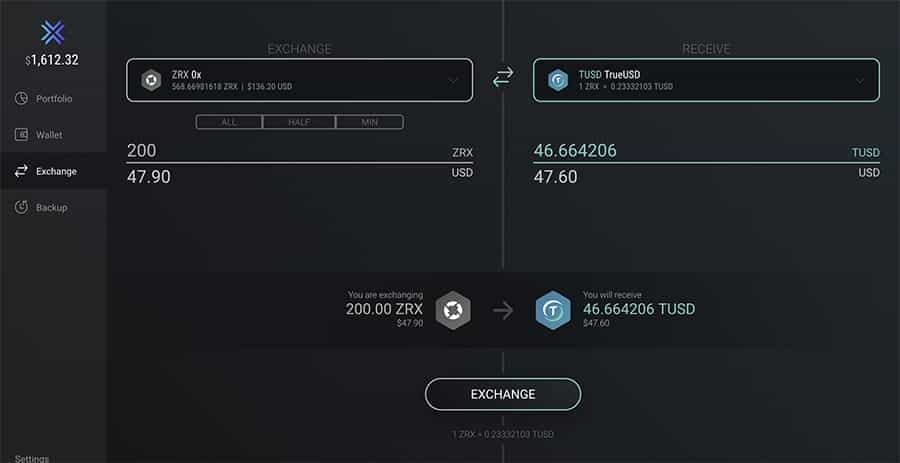
When you are certain of your purchase conditions then you can hit “exchange” and the transaction should go through. Given that you will have to wait for the coins to be sent to your wallet, most of these exchanges will take under 30 minutes.
Once you have completed the exchange, you can close the wallet and the coins should be there when you open it up again. If you don’t see your coins appear after a successfully completed exchange you may need to refresh your wallet or contact Exodus Support.
Staking Assets
Exodus offers a way for users to stake multiple assets directly within the wallet as well. With the introduction of assets that use the Proof of Stake (PoS) consensus model, users are able to stake and earn passive income for many of their favourite assets such as Cardano, Algorand, Cosmos, Solana and more directly from within the Exodus wallet.
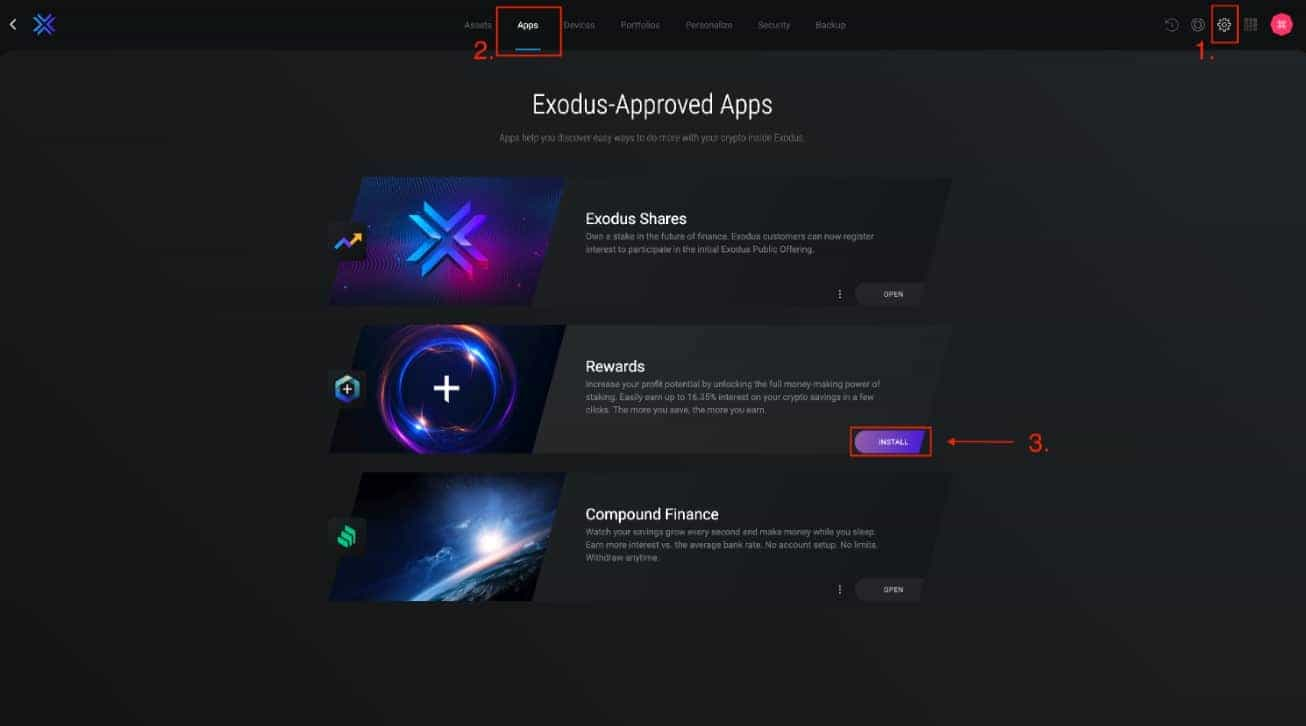
Feel free to have a look at the Exodus Staking Guide to learn how to get started staking in Exodus.
Staking works quite differently among the various assets that users choose to stake. Some assets require lockup periods, and the claiming rewards function works differently for some assets so be sure to check out the Exodus knowledge base to learn more about the asset you would like to stake before getting started so you know what to expect. The APY is variable and the current rewards can be seen in the rewards app.
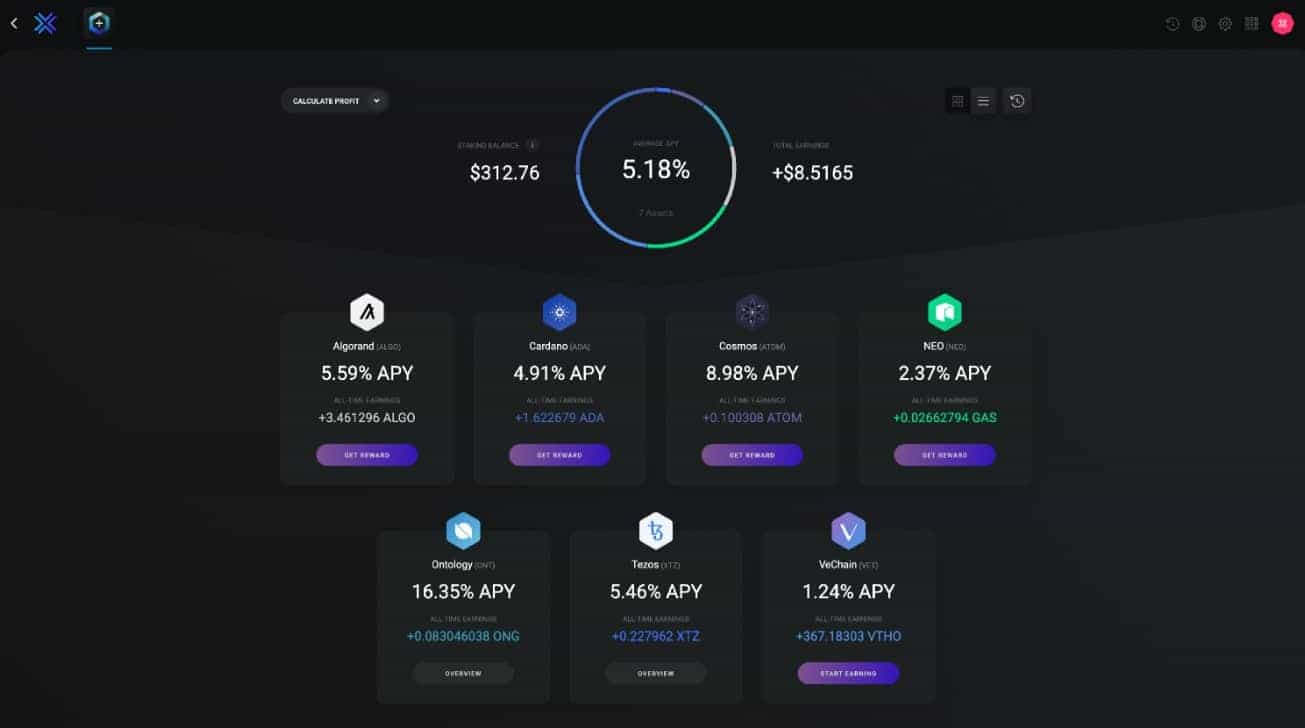
NFT Marketplace and Gallery
NFTs may have lost their shine, but the popularity of the Exodus wallet skyrocketed as it became one of the first, and remains one of the very few non-custodial wallets with a built-in NFT marketplace and gallery.
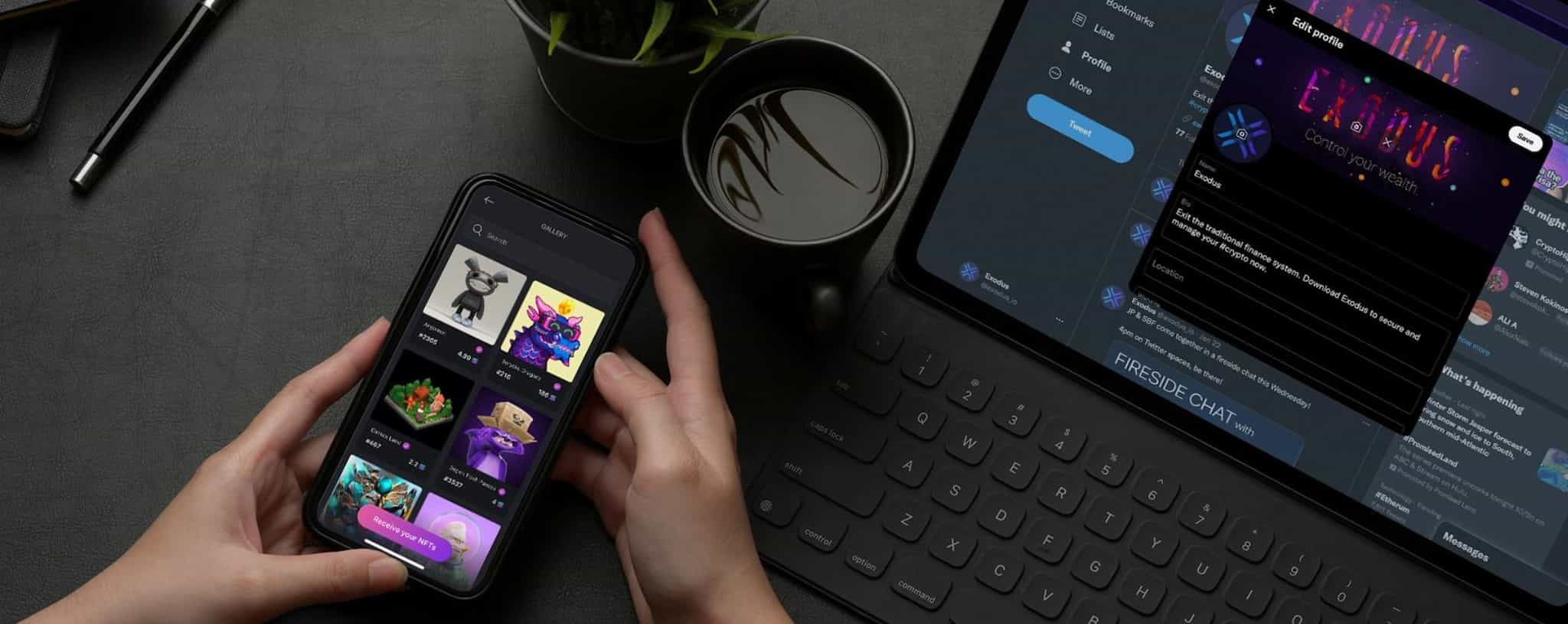
Users can access the NFT gallery in Exodus mobile or desktop to receive, store, display, and share their NFTs. The NFT gallery supports receiving NFTs on the Solana network.
The NFT Marketplace is where users can buy and sell NFTs on the Solana network from inside the Exodus wallet. Exodus has partnered with NFT platform Magic Eden, the leading NFT marketplace of Solana. The NFT marketplace in Exodus offers an impressive number of verified collections.
Just as with the other apps, to access the NFT marketplace and NFT gallery, users will need to install the app from within the Exodus wallet.
On Desktop:
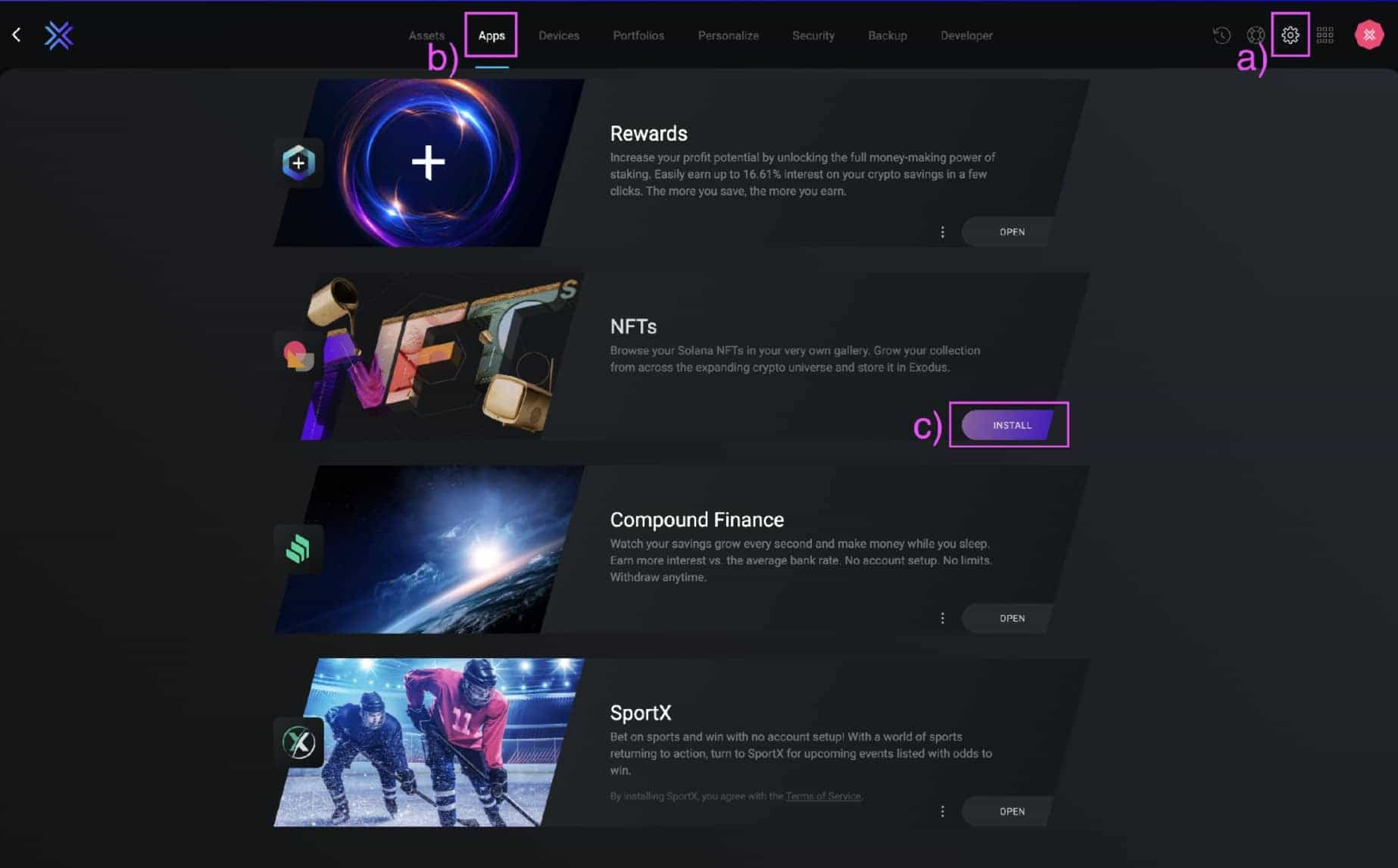
On Mobile:
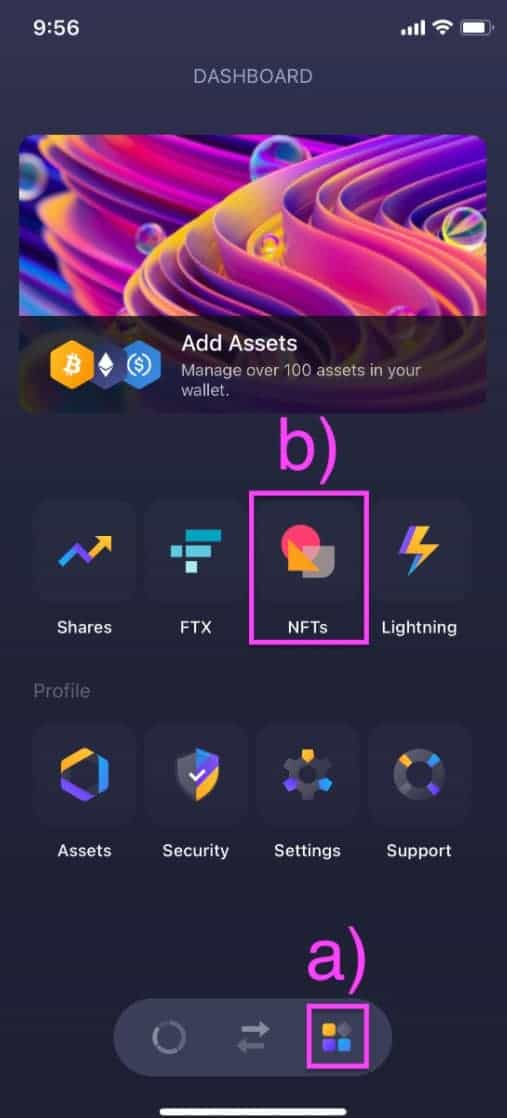
Once the app is downloaded, users can navigate to their personal NFT gallery or the marketplace where they can buy and sell NFTs:
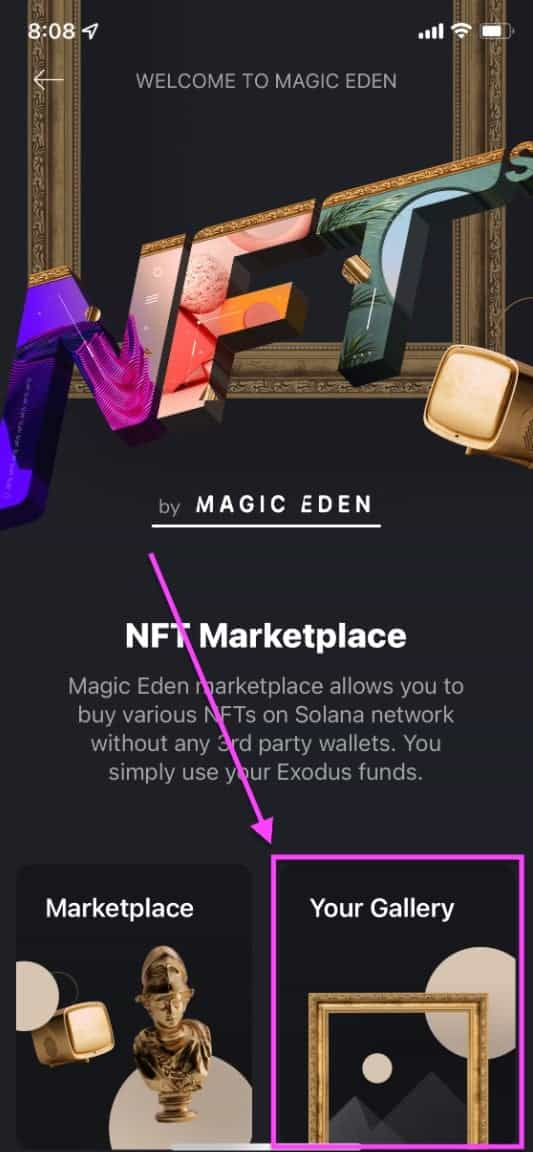
Exodus has put together a robust knowledge article providing users with step-by-step instructions and everything they need to get involved with the Exodus NFT gallery and marketplace for your convenience.
Exodus Mobile Wallet
Many crypto users are looking for a way to manage their crypto on the go. Fortunately, the Exodus mobile wallet has the same high-level security and features, and shares many of the same functions as the desktop wallet, making the Exodus mobile wallet one of the most popular, robust, and functional mobile wallets available.
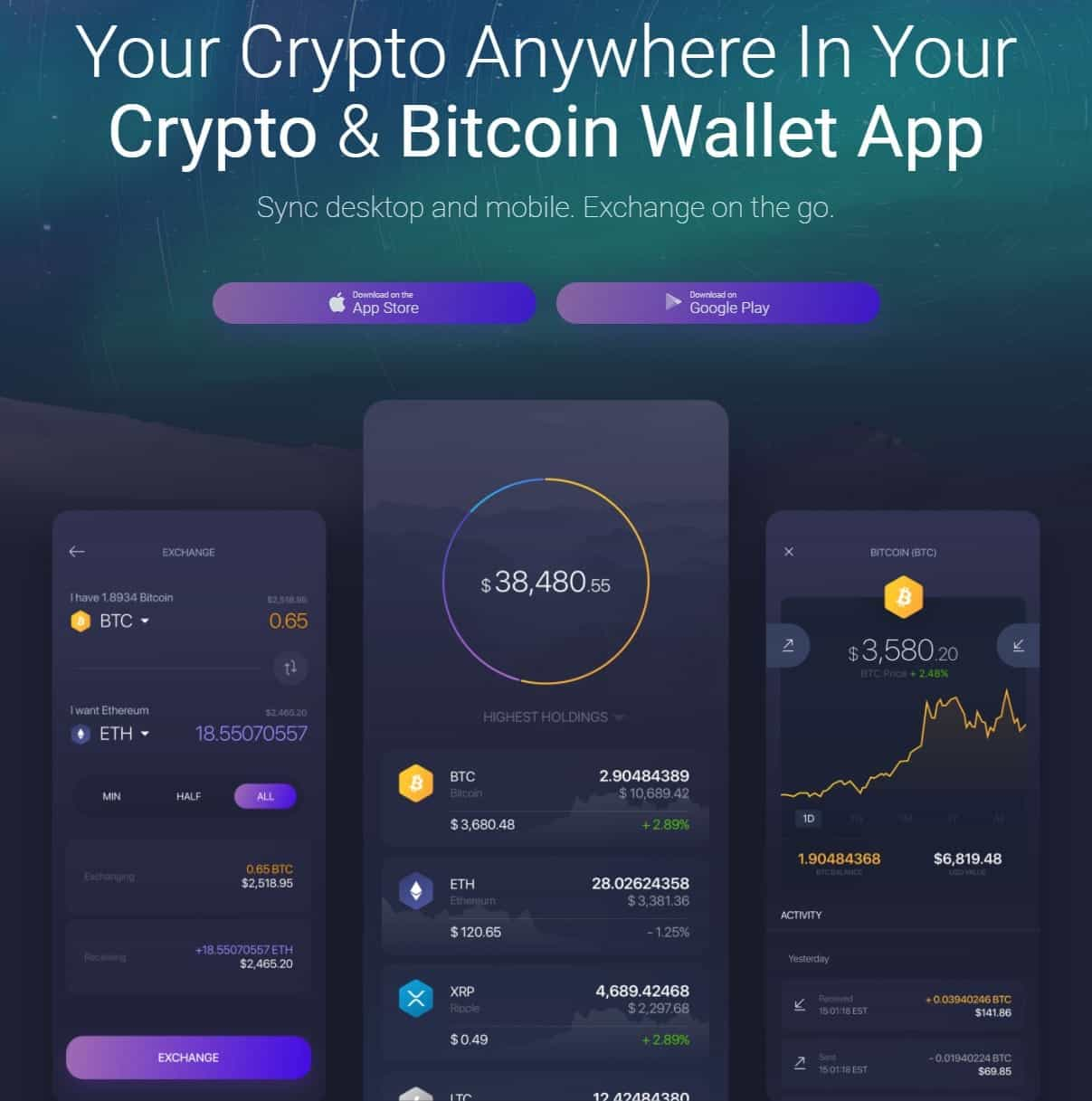
Users don’t need to have the desktop app installed to use the mobile wallet, it is a fully functional stand-alone mobile wallet, sharing the same great design and feel as the desktop version. For users who want to use both, Exodus features an option to sync mobile and desktop wallets for convenience.
For added security along with a password, crypto users can also enable biometrics on their devices and enable face or fingerprint scanning to help protect against unauthorized access. The mobile app can be used to check crypto prices, track your portfolio, send, receive, exchange, stake, and access multiple crypto apps.
The mobile wallet app is available for both iOS and Android. Staying true to the crypto spirit, there is no KYC or account sign-up needed to get started with Exodus.
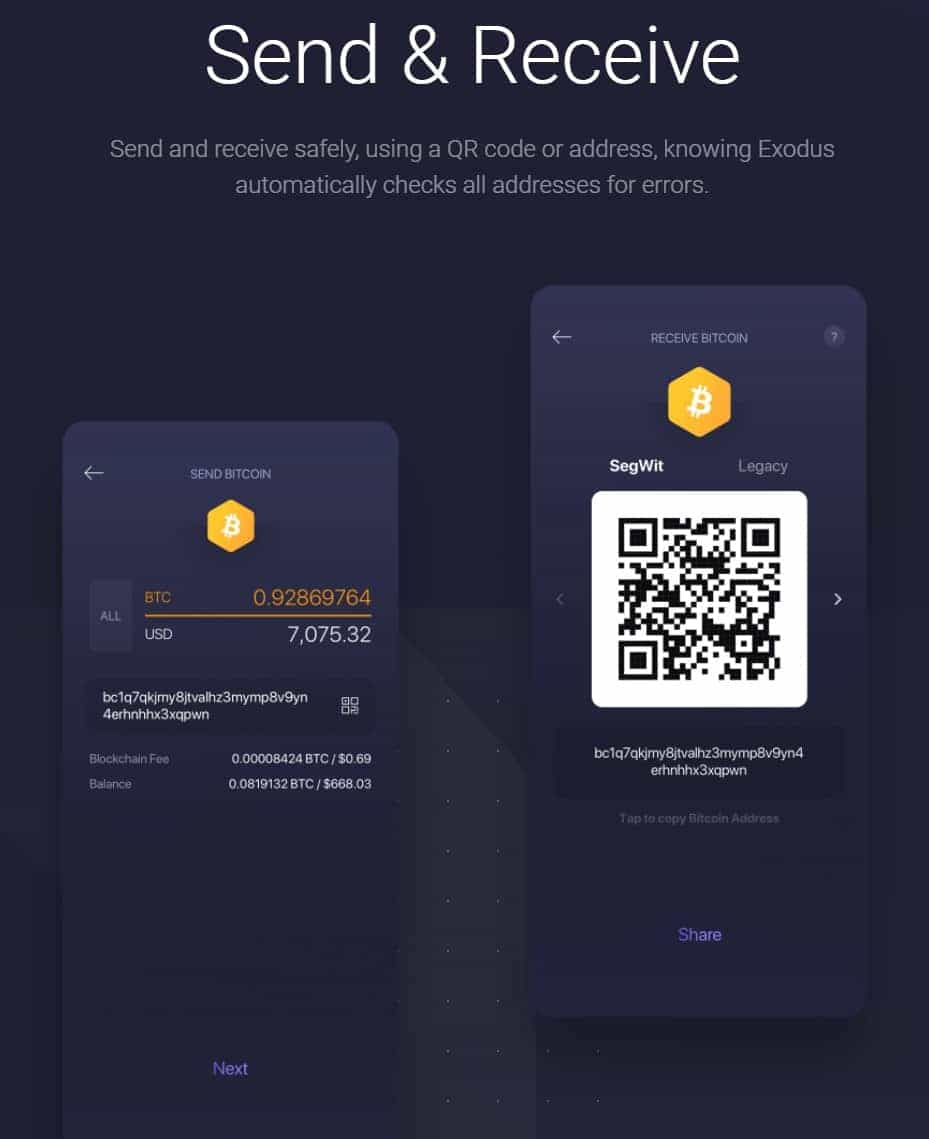
Important Note- As with many crypto platforms, there are occasionally fake versions of the Exodus wallet featured on the app store that are uploaded by scammers looking to steal users' crypto. Be sure to always download verified crypto software directly from the official Exodus wallet download page for both mobile and desktop.
Exodus Web3 Wallet
Exodus continues to be one of the most innovative wallets in the crypto space, and impressed users with the launch of the Exodus Web3 Wallet.
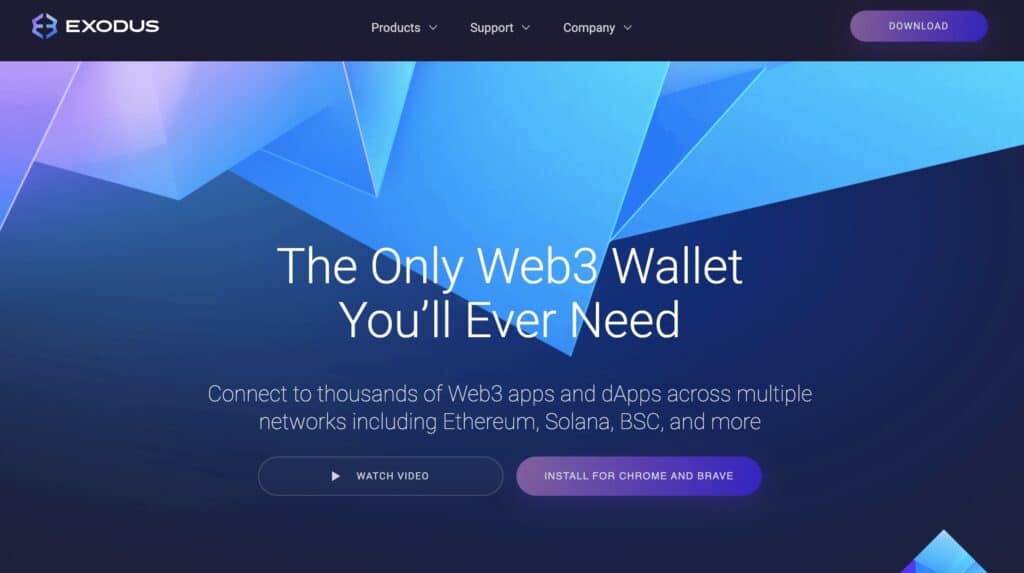
The Exodus Web3 Wallet is a browser extension wallet that is available on Chrome and Brave browsers. It will be familiar to users of MetaMask, (though much easier on the eyes), and can be used to connect to DApps on the Ethereum, Solana, BSC networks, and more.
Exodus Public Offering
Exodus closed its Reg A+ public offering on May 5, 2021, issuing 2,733,229 tokenized shares of their Class A common stock and raised approximately $75 million. The shares were open for purchase by the public and were quickly sold out to investors who wanted to get involved and believe in the growth of Exodus as a company.
Staying true to the cryptocurrency ecosystem, Exodus released their shares to investors as “Exit” Tokens on the Algorand Blockchain. The exit token acts as a digital representation of Exodus shares which users are able to hold directly within the Exodus wallet as they would with other crypto assets.
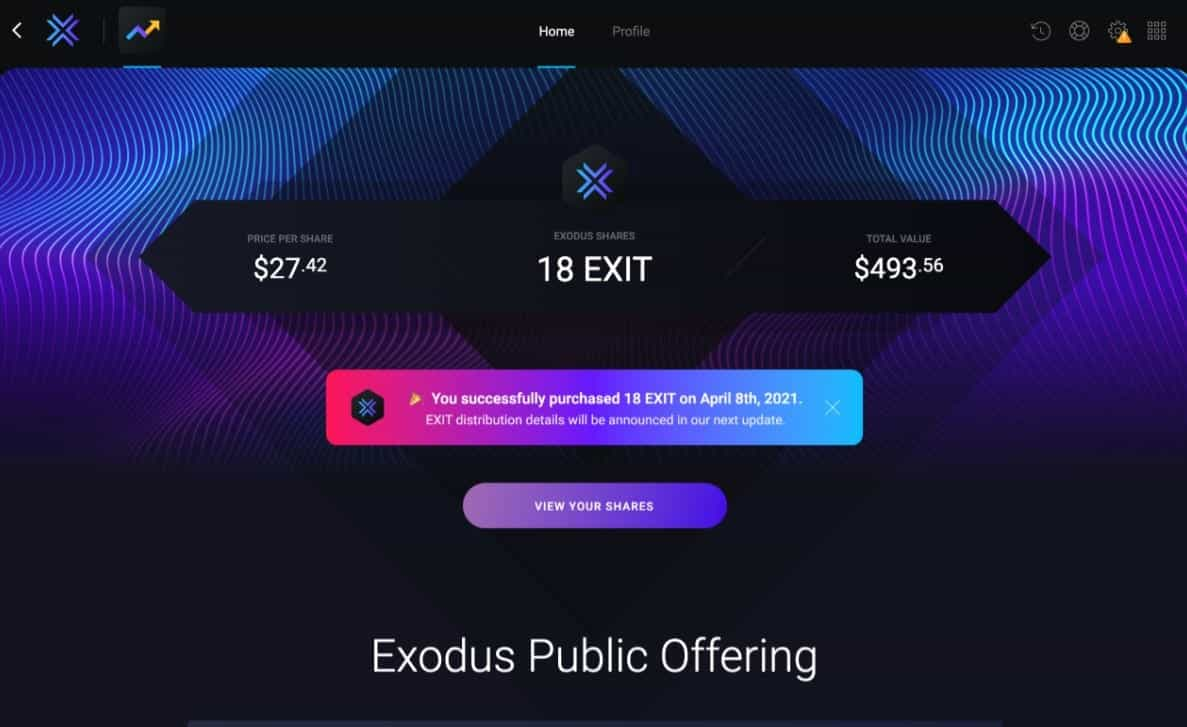
Exodus shares are currently available to buy and sell directly within the Exodus wallet through an integration with tZERO which is a brokerage account that gives users access to buy and sell digital securities. Users are able to hold Exodus shares in their wallet and transfer them to tZERO directly without leaving their wallet, after creating an account with tZERO of course and going through KYC verification. Once users create a tZERO account, they will be able to buy and sell their Exodus shares, along with other digital securities supported by tZERO.
The “exit” tokenized representation of Exodus class A common stock was priced at just under $28 at the time of launch. You can find more information about Exodus shares by navigating to the Exodus Investor’s page.
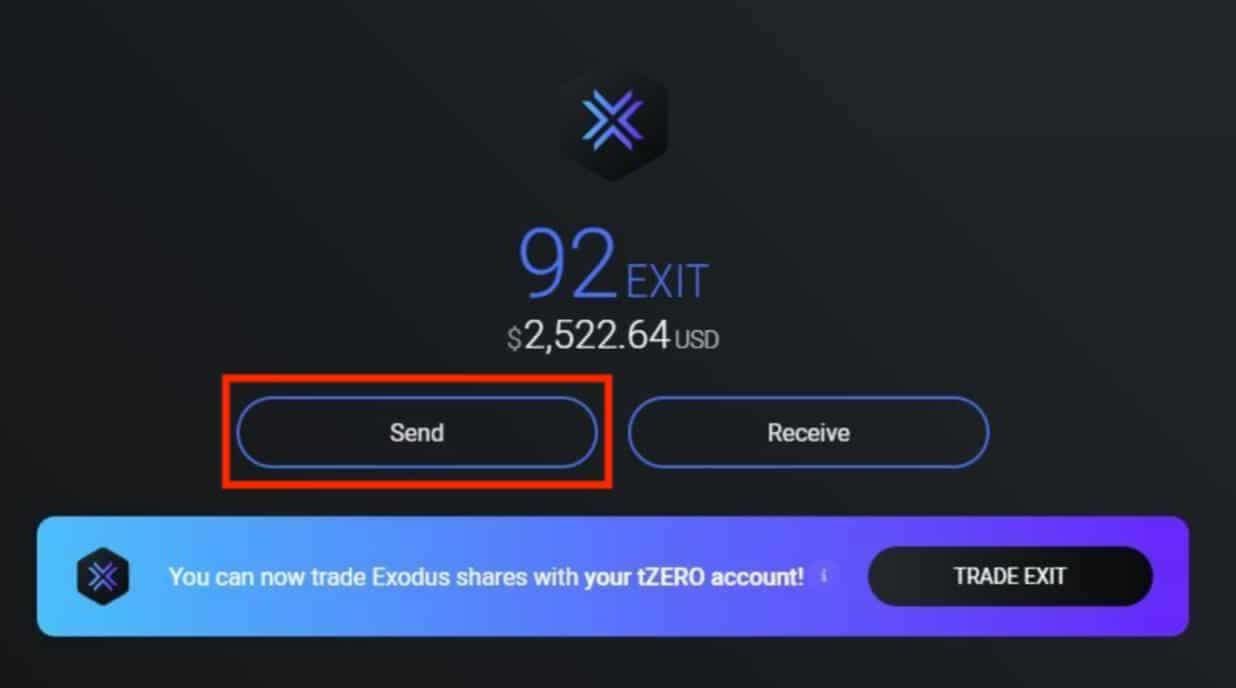
How Exodus Makes Money
Although the Exodus wallet is not open source, it is still free to download onto your mobile or desktop device. Exodus does not charge a fee to send, receive, or store crypto assets. However, if you want to use the built-in exchange option, there will be a small spread fee added to the coin exchange rate. The exact amount will be listed in the exchange section when you are doing the exchange.
These spreads may vary due to the fact that markets have different levels of liquidity. For example, you are likely to get much lower spreads on BTC / ETH than you are when exchanging lower market cap altcoins among each other. Users should also be aware that along with the spread, there will also be the network fee that goes to the network miners and validators to process and validate the transactions. No portion of the network fee is charged by, nor goes to Exodus.
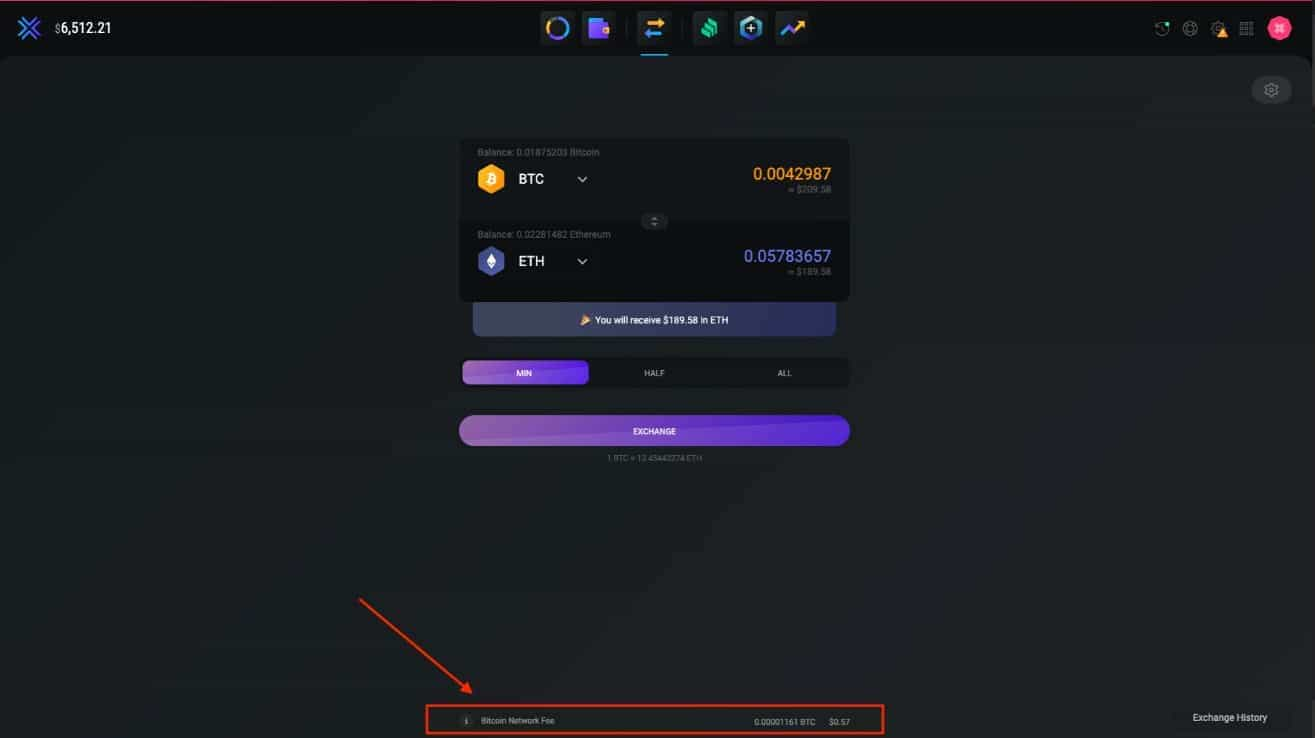
I like the fact that they are fully transparent about these spreads and network fees right there at the time of purchase. Moreover, they state that they use the fees that they generate from the spread to maintain the security and continue the development of the wallet, continually adding support, features and functionality. If this is indeed where the fees are going, then it is probably the best way to be spent.
Wallet Support
Given that the Exodus team is able to generate an income for the wallet, they are able to dedicate some resources to wallet support. That begins with the extensive knowledge base on the Exodus website, which contains over 100 articles that explain the usage, features, troubleshooting, fees and other aspects of the wallet and its usage.
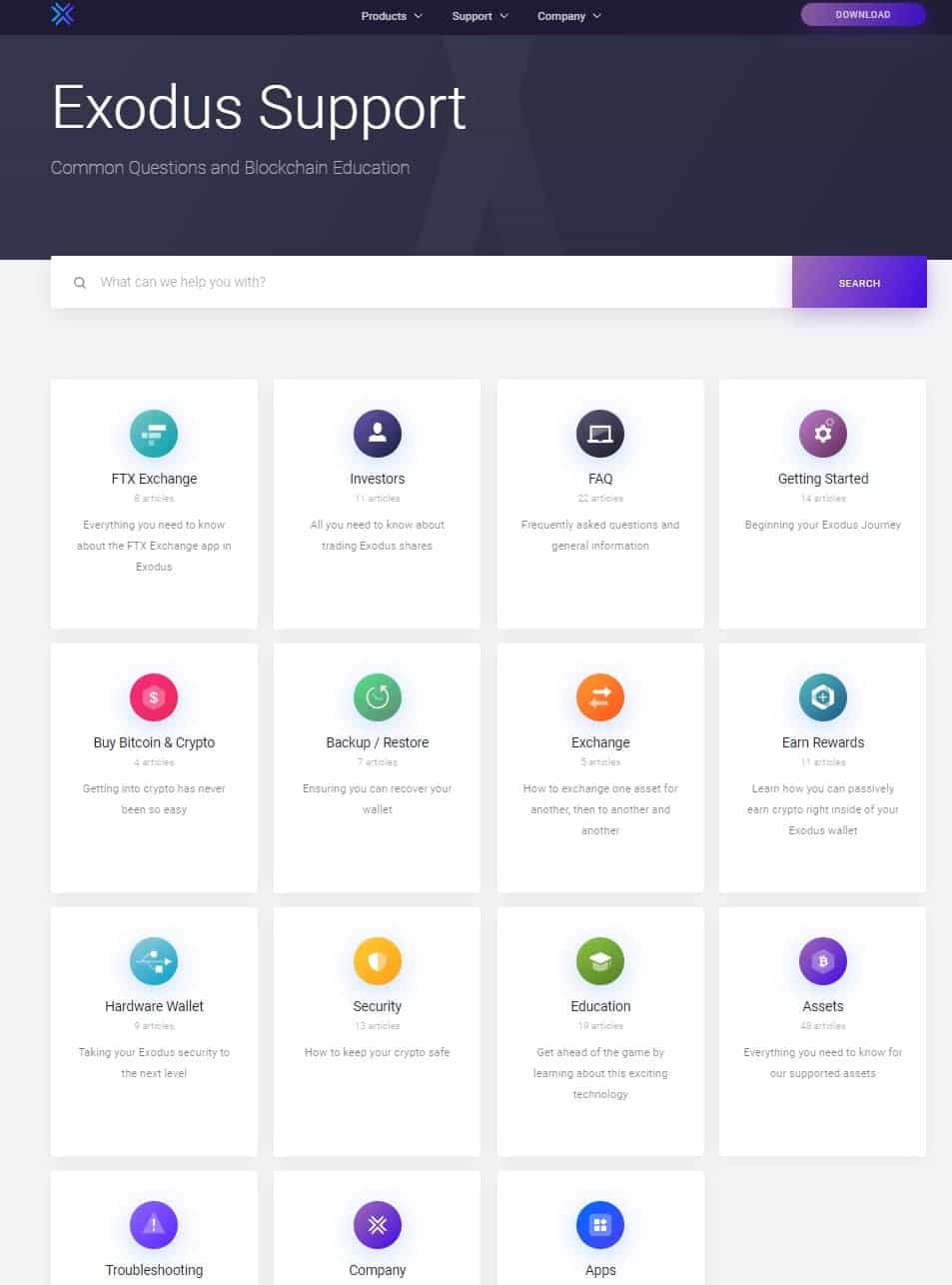
There is also an extensive searchable FAQ and if you can’t find a suitable answer you can reach out to support personnel via email and social media channels. In an industry where support is often a second thought, the support for Exodus can only be described as phenomenal as they offer 24/7 365-day support.
It is important to note that Exodus does not provide telephone support. Hence, if you happen to see numbers that are posted online as “official” Exodus phone numbers, avoid these. They are likely to be a phishing scam and the operators are trying to get their greedy hands on your private keys. Remember that Exodus support, nor any support team should be asking for information such as private keys or recovery phrases. Whoever holds your private keys, or knows your secret 12-word recovery phrase has access to your funds so you should always avoid giving that information to anyone claiming to be from a support team.
Exodus Wallet Review: Conclusion
For beginners and experienced users with small to moderate amounts of cryptocurrencies to store, the Exodus wallet is an excellent choice. Its beautiful design and ease of use have made it a favourite choice among cryptocurrency enthusiasts.
The addition of a built-in exchange makes it even more convenient and versatile, allowing users to quickly make trades and manage their cryptocurrency portfolio without excessive transactional fees, or having to send funds to a centralized exchange.
The Exodus wallet does remain a software wallet and a hot wallet for most users whose devices are connected to the internet 24/7. This makes it not as secure as a hardware wallet, but if users are following good security procedures for their PC and online life, then there should be no concerns.
Overall, the Exodus wallet is an excellent choice for most cryptocurrency users who want to send, receive and store cryptocurrency.
Frequently Asked Questions
The Exodus wallet is a multicurrency cryptocurrency wallet. It is packed with numerous features such as an option that allows users to stake assets directly within the wallet to earn passive income, and users can even exchange cryptocurrencies within the wallet. Exodus wallet supports thousands of assets, and their instant exchange integration feature allows users to swap over 100 supported digital currencies, meaning the coins never have to leave the safety and security of the user’s own wallet.
Here's what the process looks like for desktop:
- Download the Exodus Wallet, which is available for Windows, Mac and Linux. It's best to download the wallet from the company's website.
- Once the wallet has been downloaded and installed, you need to secure your wallet. This isn't something that's part of the installation process by default. To do that, you need to click on the gear icon to bring up settings.
- Then, click on either the security tab to create a strong password.
- Now, Exodus will automatically generate custom recovery phrases. It's important that you keep them safe because they will be required to access your wallet.
- Exodus will then ask you to verify the recovery phrase.
- Once that's done, you're good to go.
Yes, Exodus is one of the most well-established, reputable, and secure crypto wallets available. The team behind Exodus are completely public and the company itself went public in 2021. The founders of Exodus are highly respected within the crypto community and the team are dedicated to the betterment of the entire crypto industry. The company ensures that the wallet passes multiple audits and as the wallet is non-custodial, the user remains in full control over their crypto assets and the company does not collect any personal information on behalf of the user.
Exodus reviews online are also overall positive, with high rankings in both the IOS and Google Play stores. There is also a lot of positive sentiment regarding Exodus reviews on the Exodus Reddit forum.
Exodus is 100% free for users looking to download the app and send/receive crypto. Almost all blockchain transactions incur network or miner fees (with a few exceptions). Other than these transaction fees, 100% of which go to the network, Exodus does not charge fees for sending. You will never pay transaction fees when receiving in Exodus.
Users will experience fees if they choose to exchange assets within the wallet. Exodus charges a small fee in the form of an exchange spread on swaps made in the wallet, you can find out more on the Exodus Fees page.
Exodus Wallet, as a company, has never been hacked. The wallet undergoes regular security updates and audits to ensure it remains as secure as possible. It is important to understand that as a non-custodial wallet, much of the responsibility with security is in the hands of the user. Cryptocurrency wallets are only as secure as the devices that they are installed on. If a user’s computer is full of malware and viruses, any non-custodial wallet is at risk of being breached.
Disclaimer: These are the writer’s opinions and should not be considered investment advice. Readers should do their own research.


